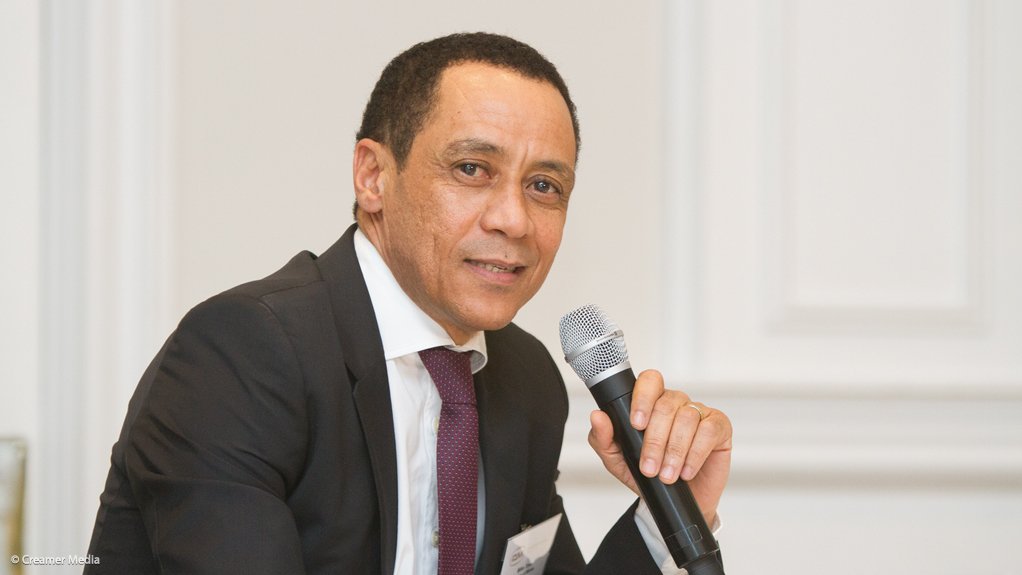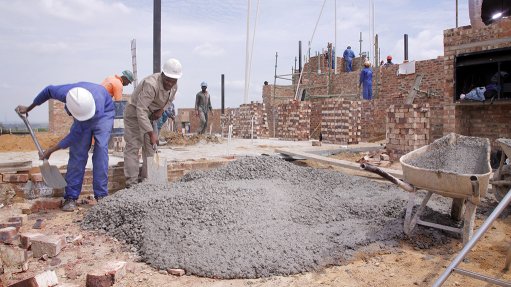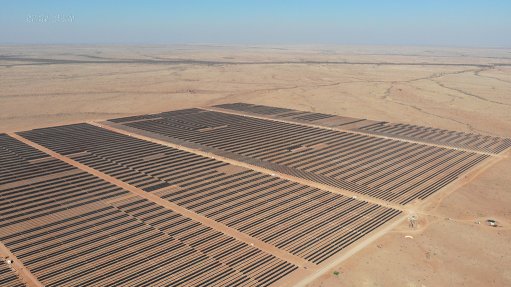Chamber calls on mining to renounce its apartheid past
CAPE TOWN (miningweekly.com) – Mining is the foundation of the South African economy. Much of the manufacturing and services sectors exist because they were initiated to service and provide inputs to the mining industry since the second half of the nineteenth century.
However, mining was also one of the foundation stones of South Africa’s apartheid history – and the industry has done itself a disservice by not fully acknowledging that fact, Chamber of Mines president Mike Teke said on Monday.
The failure of the mining industry to admit its past continued to burden the industry and its reputation in the eyes of many of its stakeholders, Teke said in an unprecedented mea culpa speech at the Investing in African Mining Indaba, which is being attended by Creamer Media’s Mining Weekly Online.
“One of my greatest wishes is that the industry resolves to deal with this. And soon,” said Teke, who declared a more direct link between profit and employee earnings as being "highly desirable" and expressed a determination to more with the R2-billion yearly corporate social investment spend to better relationships with near-mine communities.
Noting the participation of many high-level delegations from around Africa as perhaps signalling a far greater degree of cooperation between the countries of the continent, he also quashed to contention that the post-apartheid transfer of the ownership of minerals to the State and the advent of the Mining Charter were to blame for the country missing the last mining boom when expressed in terms of mining’s lower contribution to South Africa’s gross domestic product.
On the contrary, he declared mining’s lower proportion of the South African economy as positive.
“It’s a good thing, here in Africa, for our economies to become less dependent on the primary industries – mining and agriculture – so we should welcome the fact that other sectors are flourishing,” Teke said.
Even from the point of view of own narrow self-interest, other sectors of the economy doing well would likely translate into improved mining sales through investment in equities, sales of gold and platinum, and cars and jewellery and more construction.
What South Africa saw during the boom were declines in production of gold and diamonds – which had been the backbone of the South African economy, diamonds from the 1860s and gold from the 1880s onwards – as a result of long-established mines reducing production or closing because of orebody depletion.
South African gold production began falling from its 1 000 t a year production peak in 1970 to below 700 t by 1980.
South African gold production was 400 t at the beginning of the commodities boom in the early 2000s and less than 200 t by the time the boom ended in 2010.
Teke emphasised that the output decline was not a consequence of regulatory issues but the maturity of the sector, which new mining methods would likely now reverse.
In the interim, the commodities boom proved wonderful for platinum, good for iron-ore and even positive for coal.
Investment in the northern and eastern limb of the platinum belt boomed, on the assumption that the world economy would continue to grow as rapidly as it was doing then.
Small towns and villages like Rustenburg and Burgersfort became large cities and towns.
New suppliers came on stream – which was a good opportunity to bring new black producers and contractors into the industry.
Shareholders in the right sectors did well. So too did employees in certain companies at which employee share schemes were established and vested at opportune times.
He conceded that there was some validity in mining being attacked for shareholders and executives benefiting disproportionately more from the boom than mineworkers and spoke of opportunities to ensure that it would not happen again during the next commodities boom.
But it would have had less validity had the industry succeeded in introducing a link between profit and wages into the pay package of gold workers in the 1990s and 2015.
He expressed regret that trust levels had not yet reached a point where labour was willing to accept the concept, which arguably cost employees during the gold upturn in the second half of 2016, although most gold companies did put in place bonus systems to take some account of this.
He urged that the dialogue on a link between performance and pay between management and labour should continue.
“It’s not merely an issue of fairness. It would also mean a more sustainable industry, and more sustainable jobs,” Teke contended, adding that the growing gap between executive pay and average employee pay was not only a source of increased alienation of South Africans, but also people in many parts of the world.
“But in South Africa’s mining environment, particularly given the industry’s role in our apartheid history, it’s a matter of particular focus,” he disclosed.
Collective bargaining in South African mining had been a major force for transformation for the last 35 years, since the founding of the National Union of Mineworkers in 1982, when mining wages were relatively low compared with other industrial sectors.
However, currently they are among South Africa’s highest and the peaceful resolution of wage negotiations in gold and platinum over the last two years suggested that some progress had been made.
“But a more direct link between profit and employee earnings is highly desirable,” he reiterated.
Cause for greater concern was the relationship between mines and mining communities.
Conflict between communities – or at least groups in communities – and mine management had become a source of serious financial and reputational cost.
Community grievances about dust, water, noise and loss of agricultural land with inadequate compensation, had not been ameliorated by the R2-billion that mining companies channel into corporate social investment and other initiatives each year.
This was particularly troubling, as it fed into the continuing resentment of the industry stemming from the apartheid era.
“We’re losing the battle for hearts and minds,” he contended in calling for a business model that aggressively pursued value creation for all.
Comments
Press Office
Announcements
What's On
Subscribe to improve your user experience...
Option 1 (equivalent of R125 a month):
Receive a weekly copy of Creamer Media's Engineering News & Mining Weekly magazine
(print copy for those in South Africa and e-magazine for those outside of South Africa)
Receive daily email newsletters
Access to full search results
Access archive of magazine back copies
Access to Projects in Progress
Access to ONE Research Report of your choice in PDF format
Option 2 (equivalent of R375 a month):
All benefits from Option 1
PLUS
Access to Creamer Media's Research Channel Africa for ALL Research Reports, in PDF format, on various industrial and mining sectors
including Electricity; Water; Energy Transition; Hydrogen; Roads, Rail and Ports; Coal; Gold; Platinum; Battery Metals; etc.
Already a subscriber?
Forgotten your password?
Receive weekly copy of Creamer Media's Engineering News & Mining Weekly magazine (print copy for those in South Africa and e-magazine for those outside of South Africa)
➕
Recieve daily email newsletters
➕
Access to full search results
➕
Access archive of magazine back copies
➕
Access to Projects in Progress
➕
Access to ONE Research Report of your choice in PDF format
RESEARCH CHANNEL AFRICA
R4500 (equivalent of R375 a month)
SUBSCRIBEAll benefits from Option 1
➕
Access to Creamer Media's Research Channel Africa for ALL Research Reports on various industrial and mining sectors, in PDF format, including on:
Electricity
➕
Water
➕
Energy Transition
➕
Hydrogen
➕
Roads, Rail and Ports
➕
Coal
➕
Gold
➕
Platinum
➕
Battery Metals
➕
etc.
Receive all benefits from Option 1 or Option 2 delivered to numerous people at your company
➕
Multiple User names and Passwords for simultaneous log-ins
➕
Intranet integration access to all in your organisation





















